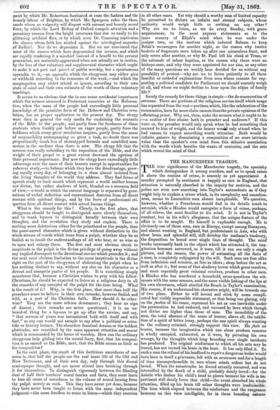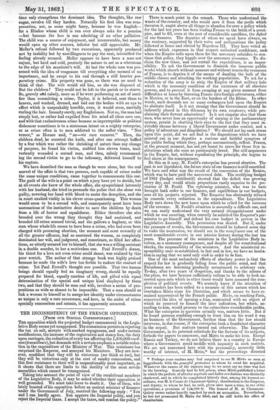THE MANCHESTER TRAGEDY.
THE true significance of the Manchester tragedy, the specialty which distinguishes it among murders, and so to speak raises it above the routine of crime, is scarcely as yet appreciated. A murder prompted by sentiment is happily so rare in England, that attention is naturally absorbed in the inquiry for motives, and the police are even now searching into Taylor's antecedents as if they might help to explain a crime which, in its complexity and causeless- ness, seems to Lancashire men almost inexplicable. We question, however, whether a Frenchman would find in its details much to astonish, while a Hindoo would recognize a form of crime, perhaps, of all others, the most familiar to his mind. It is not in Taylor's conduct, but in his wife's allegiance, that the unique feature of the affair is to be sought. He himself is explicable enough. He is obviously one of those men, rare in Europe, except among Biscayans, and almost wanting in England, but predominant in Asia, who with clear brain and splendid will, still develop the madman's tendency, the disposition to brood over single lines of thought. The mind works incessantly back to the object which has attracted it, the ima- gination becomes narrowed, as it were, till it can see only a single picture, and the reason, the power of estimating all the facts of a case, is completely subjugated by the will. Such men are free alike from indecision and remorse, as free as idiots; sleep before the act as well as after it; feel none of that shadowy terror which great resolves, and more especially great criminal resolves, produce in other men. A Hindoo who has murdered a household, cross-questions the wit- nesses with the same acumen, and the same visible licking of the lips at his own cleverness, which startled the Bench in Taylor's examination. His course, if we understand his character aright, will be towards one of two plans. Either he will invent and stick by some compli- cated but visibly impossible statement, or that being too glaring, rely on the justice of his cause, represent his act as one inevitable under the persecution lie had endured, and excused by laws which though not divine are higher than those of man. The immobility of the man, the total absence of the sense of horror, above all, the exhibi- tion of a spirit of bitter irony, perhaps the one spirit always wanting to the ordinary criminal, strongly support this view. He feels no horror, because the imagination which can alone produce remorse is wholly occupied, exhausted, as it were, by picturing his own wrongs, by the thoughts which long brooding over single incidents has produced. The original misfortune to which all his acts may be traced, has not turned his brain in the least. It has only filled it. To such a man the refusal of his landlord to repair a dangerous boiler would have been in itself a grievance, felt with an acuteness and for a length of time incomprehensible to men whose minds reflect but do not brood. When the catastrophe he feared actually occurred, and was intensified by the death of a child, probably dearly loved—for the Asiatic who dashes his child's head to pieces because his wife is im- pertinent still dearly loves that child—the event absorbed his whole attention, filled up his brain till other thoughts were inadmissible. The time which elapsed between the misfortune and the vengeance becomes on this view intelligible, for in these brooding natures time only strengthens the dominant idea. The thoughts, like raw sugar, revolve till they harden. Naturally his first idea was com- pensation, not, as some might fancy, because he was English— for a Hindoo whose child is run over always asks for a pension but because the loss is one admitting of no other palliative. The child was a source of enjoyment, and irrecoverable, but money would open up other sources, inferior but still appreciable. Mr. Meller's refusal followed by two executions, apparently produced not by inability but by unwillingness to pay the rent, intensified the feeling already aroused. Meller appears to have been a man not unjust, but hard and cold, precisely the nature to act as a whetstone to the edge of his murderer's will. At last the whole man was pos- sessed with the idea of vengeance till everything else seemed of no importance, and he swept to his end through a still heavier pre- paratory crime. His property was gone, so there was no need to think of that. The wife would aid him, so she was disposed of. But the children? They could not be left to the parish or to starve. So, gravely mg calmly, more as if he were performing an act of sacri- fice than committing a crime, Taylor, it is believed, sent them to heaven, and washed, dressed, and laid out the bodies with an eye to effect which is unspeakably horrible, even, it would seem, carefully curling the hair. Insanity surely, say Englishmen. Not so, the man had simply lost, or rather had expelled from his mind all ideas save one, and with that exclusiveness crime became as imperceptible as political dishonour sometimes is to a statesman intent on a mighty enterprise, or as crime often is to men addicted to the softer vices. "Nec vereor," as Horace said, " ne—vir rare recurrat." Then, the children dead, he secreted the knife, and after one attempt baffled by a fear which was rather the shrinking of nature than any change of purpose, he found his victim, stabbed him eleven times, inad- vertently wounded a second man, and then, calmly recommend- ing the second victim to go to the infirmary, delivered himself to his captors.
We have described the man as though he were alone, but the real marvel of the affair is that two persons, each capable of crime under the same unique conditions, came together to consummate this one. The guilt of the wife is a point on which a jury have yet to decide, but at all events she knew of the whole affair, she sympathized intensely with her husband, she tried to persuade the police that she alone was guilty, covering her hand with blood to assist the deception, and she in court exulted visibly in his clever cross-questioning. This woman would seem to be a second wife, and consequently must have been unconscious of the instinctive desire to save the children by death from a life of horror and squalidness. Either therefore she also brooded over the wrong they thought they had sustained, and brooded till crime seemed trivial, and the gallows a bugbear, or this man whose whole life seems to have been a crime, who had even been charged with procuring abortion, the meanest and most cowardly of all the greater offences, had so mastered the woman, so completely dominated her will, and judgment, and conscience, so filled her affec- tions, so utterly Bemired her to himself, that she was a willing assistant in a double murder, to her a motiveless one. Paul Ferroll's dream, his thirst for a love not even crime could daunt, was realized by this poor wretch. The author of that strange book was highly praised because he made the wife's love too feeble to endure the contact of crime. Yet Paul Ferroll's thought was possible. That two human beings should equally feel an imaginary wrong, should be equally prepared for blood, equally careless of life, and gifted with equal determination of the special and unique kind displayed by these two, and that they should be man and wife, involves a series of pro- positions so wide as almost to be impossible. That a man should so link a woman to himself as to merge her identity under circumstances so unique is only a rare occurrence, and here, in the midst of crime specially remorseless and satanic, it has apparently occurred.































 Previous page
Previous page